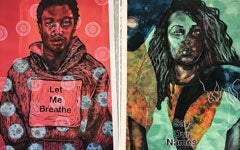
The University Art Collection recently acquired two prints by artist Delita Martin, Let Me Breathe and Say Our Names, created in the aftermath of the tragic killings of George Floyd, Breonna Taylor, Ahmaud Arbery and others at the hands of white police officers last summer. Art Curator LuLen Walker discovered the prints when she attended “Black Women of Print: A Virtual Studio Visit and Conversation,” a virtual presentation by Martin and two other emerging artists held in conjunction with the annual Fine Print Fair last fall.
Since then, Walker had the opportunity to speak with Martin about the story behind the prints. They depict the artist’s teenage son and niece, using a complex blend of techniques that contribute to their power and beauty. Martin used gelatin and woodblock printing in a layered effect, together with drawing and painting. Both portraits incorporate hand-stitched elements, and Let Me Breathe also includes sewn-on decorative papers.
The portraits were a response to last summer’s police killings and the pandemic lockdown that prevented many people from participating fully in in-person protests. Martin saw the pain and anguish her son and niece were suffering, and started conversations with them in her studio, asking herself and her son, “why don’t we be the change that we want to see?” That led to her son posing for a portrait wearing his favorite hoodie. He asked for “Let Me Breathe” to appear on the garment.
Martin sat separately with her niece, who also agreed to a portrait. The result is the compelling half-length image with the words “Say Our Names,” challenging viewers to “say my name, look at my face, know me; I’m not invisible.” Both teenagers assisted Martin in the creative process, especially the sewn elements. Stitching is a signature component of Martin’s work originating from childhood visits with her grandmother, who was a quilt maker. Her grandmother taught her “tacking,” a light loop stitch, while she talked about her own life story. It was a powerful experience for Martin and one she describes as “stitching together my history.” The artist sees herself as “a vessel, and the stories flow through me” as she creates her figures on paper.
Martin and her son shared the portraits on social media, where they drew significant attention. While the originals are not for sale, Martin’s son suggested making giclée prints and using the revenue to give back to the community. All proceeds from the 100-print run will support the work of socially motivated artists to bring about social and political change.
This effort grew into the Art as Activism Fund and the Black Box Press Foundation, which aims to use art as “a targeted initiative” to impact perspectives and “have a broad effect on the landscape and discourse around social justice in the world.” The fund will provide grants to support artists in the production of exhibitions “that bring together the creative energy of the arts to move us emotionally with the strategic planning of activism necessary to bring about social change.” Artists Rashaun Rucker and Nastassja Swift, who both create art addressing issues surrounding prison reform, were selected out of 72 applicants for this year’s grants.
Researchers with approved access to the Library may view the prints by appointment by contacting speccoll@georgetown.edu.
